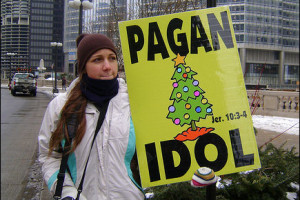Confession: there is a part of me that hates Christmas time.*
We might be quick to throw stones at Dr. Seuss’s scornful Grinch for his hatred of inarguably one of the world’s most celebrated holidays. And perhaps in part it is because his heart was 3 sizes too small. But regardless of his heart size, I contend there is certainly a tremendous amount of rational thinking that premeditated his Christmas heist. When we remember what it was that agitated this green fiend, perhaps, you, like me, will agree:
“And then! Oh, the noise! Oh, the noise! Noise! Noise! Noise!
There’s one thing I hate! All the NOISE! NOISE! NOISE! NOISE!
And they’ll shriek squeaks and squeals, racing ’round on their wheels.
They’ll dance with jingtinglers tied onto their heels.
They’ll blow their floofloovers. They’ll bang their tartookas.
They’ll blow their whohoopers. They’ll bang their gardookas.
They’ll spin their trumtookas. They’ll slam their slooslunkas.
They’ll beat their blumbloopas. They’ll wham their whowonkas.”
Can anyone else feel the similarities between the Christmas commotion in Whoville and the racketeering rucus of the commercialism compulsive Christmas of our Country? Endless cheesey re-writing of holiday jingles to describe the great holiday shopping deals. The stress of annually trying to meet expectations of getting a worthy enough gift for everyone on your list. The lines at the mall. Fighting for spots in the parking lot. The de-humanizing of family and friends as we become task driven monsters to get Christmas cards, the annual holiday pastry and toffee treats, the gift wrapping, the Christmas lights, the decorations, ad nauseam (and dare I mention the worst sound of Christmas- Paul McCartney’s “A Wonderful Christmas Time.” How can you not cringe every time you hear those tacky techno-tronic noises?).
But what is it that grates at the Grinch the most? Its when “those Whos will start Singing.” It is here that we see the Grinch’s great disconnect with the culture around him. The Grinch can only see the insane traditions and outworkings of an inner heart that is seeking to celebrate community.[1] The Who’s ultimate locus of value in Christmas is not in all the “things,” but who it is they celebrate with.
This is what the hermit Grinch could not grasp. He had a heart that had never learned what it was supposed to celebrate, nor how to do so.
Diagnosis of Confession: I think that my aptitude to being irritated or dizzied by some elements of cultural Christmas is the result of the same condition: frankly, I just don’t know how to celebrate very well.
There are probably many of your readers who can’t relate to me at all. But I’m sure there are some of you out there who can. Perhaps you see your life and schedule through lenses tinted by workaholism. Perhaps celebration brings a sense of guilt, because it seems inefficient and wasteful. Perhaps the exercise of celebrating brings about a sense of isolation or loneliness, because we can’t identify with the merry-makers around us, and to fake it would feel cheap and dishonest.
But the greatest issue at hand: we either do not yet know what it is we are to celebrate, or we do not value the object of celebration as highly as we should.
What does a Biblical theology of celebration look like? It seems clear that God provides commemoration and celebration to help teach us to devote our attention to him. We see that God actually commands Israel to observe the Feast of Unleavened Bread to remind them of the LORD’s deliverance from Egypt (Exo 12:17). The Feast of Weeks didn’t just create a break to the pattern of daily life- they demand the choicest sacrifices of the field to be sacrificed, that Israel may remember their provision, and importantly, who provided it. The Feast of Booths was a time of celebration around the 40 years of wilderness wanderings, not that 40 years in the wilderness was such a fun thing to remember, but that survival and the land inherited afterwards was so clearly provided by the Hand of God.
Remembering who is being celebrated is of paramount importance. When the covenant making God of lovingkindness became replaced with idols and false God’s, the LORD did not take too kindly to such substitutions, as the Assyrian and Babylonian exiles remind. The absence of God from the center of celebration is critical too. Route ritual in itself has no value in God’s eyes. Hence Jesus’ repudiation of the presumptuous piety of the Pharisees.
Finally, lest anyone think that feasting and celebration is dead and blasé, let us not forget the there is an unimaginably spectacular celebration we have to look forward too. This wedding feast, like we would expect, has Christ at the center (Matt 22). When it comes to celebrating, there is nothing more important than “keeping the main thing, the main thing.”
From the pulpit and Bible studies, we speak a great deal about ensuring that Jesus and the Gospel does in fact become the center of our lives. The center of our work. The Center of our Family. The center of our life mission and our personal ambitions. The center of wealth. The center of our service. And Jesus has every claim to be the center of our celebration.
Treatment: If celebration happens in community, and celebration is founded on the element that we have relationship with our redeemer, lover, and LORD, perhaps a healthy way to kick the Christmas Grinch in each of us is to consider the importance of community. As we saw in the Pariah of the Who’ish community, connectivity to a community that “gets it” is not only a way to learn how to celebrate, but also provides the fellowship to foster right celebration.
For all other other poor-celebrators out there, may this advent be spent seeking out those who do know how to rejoice and remember our LORD through recreation and rest. May we also not forget the immanence that the incarnation so intimately invites. And may your heart grow three sizes with mine as the Church becomes our coach in celebrating.
[1] See the 2nd to last couplet of the TV version of the story “Christmas Day will always be, just as long as we have we.”





1 Comment
Leave your reply.